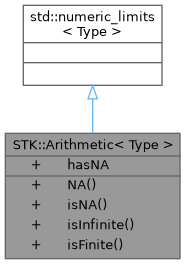Arithmetic properties of STK fundamental types. More...
#include <STK_Arithmetic.h>

Static Public Member Functions | |
| static Type | NA () throw () |
| Adding a Non Available (NA) special number. | |
| static bool | isNA (Type const &x) throw () |
| static bool | isInfinite (Type const &x) throw () |
| static bool | isFinite (Type const &x) throw () |
Static Public Attributes | |
| static const bool | hasNA = false |
| True if the type has a representation for a "Not Available." | |
Detailed Description
struct STK::Arithmetic< Type >
Arithmetic properties of STK fundamental types.
This class allows a program to obtain information about the representation of a STK fundamental type on a given platform. For non-fundamental STK types, the functions will return 0 and the data members will all be false.
- A NA (Not Available) type is defined. If the fundamental type have a quiet_NaN, a NA is a quiet_NaN and the quiet_NaN is no more available.
- If the fundamental type does not have a NaN, the greatest value is used.
- If the fundamental type is an Integral type (
union), a NA is the value (if any) defined in the declaration.
The class arithmetic<Type> inherit from std::numeric_limits<Type> whom which we give hereafter the definition.
Definition at line 187 of file STK_Arithmetic.h.
Member Function Documentation
◆ isFinite()
|
inlinestatic | ||||||||||||||
- Parameters
-
x the value to test.
- Returns
trueif the parameterxis a finite value,falseotherwise
Definition at line 208 of file STK_Arithmetic.h.
References STK::Arithmetic< Type >::isInfinite(), and STK::Arithmetic< Type >::isNA().
Referenced by STK::Stat::covarianceSafe(), STK::Stat::covarianceSafe(), STK::Stat::covarianceWithFixedMeanSafe(), STK::Stat::covarianceWithFixedMeanSafe(), STK::isFinite(), STK::SafeOp< Type >::operator()(), STK::IsFiniteOp< Type >::operator()(), STK::Gamma_ak_b< Array >::run(), STK::Gamma_ak_bj< Array >::run(), STK::Stat::standardize(), STK::Stat::standardize(), STK::Stat::standardizeByRow(), and STK::Stat::standardizeByRow().
◆ isInfinite()
|
inlinestatic | ||||||||||||||
- Parameters
-
x the value to test.
- Returns
trueif the parameterxis an infinite value,falseotherwise
Definition at line 203 of file STK_Arithmetic.h.
Referenced by STK::Arithmetic< Binary >::isFinite(), STK::Arithmetic< Sign >::isFinite(), STK::Arithmetic< Real >::isFinite(), STK::Arithmetic< TRange< Size_ > >::isFinite(), STK::Arithmetic< Type >::isFinite(), STK::isInfinite(), and STK::IsInfiniteOp< Type >::operator()().
◆ isNA()
|
inlinestatic | ||||||||||||||
- Parameters
-
x the value to test.
- Returns
trueif the parameterxis a NA value,falseotherwise
Definition at line 198 of file STK_Arithmetic.h.
Referenced by STK::Arithmetic< Binary >::isFinite(), STK::Arithmetic< Sign >::isFinite(), STK::Arithmetic< Integer >::isFinite(), STK::Arithmetic< Real >::isFinite(), STK::Arithmetic< String >::isFinite(), STK::Arithmetic< TRange< Size_ > >::isFinite(), STK::Arithmetic< Type >::isFinite(), STK::isNA(), STK::MultiLaw::JointProbability< RowVector, Law >::lpdf(), STK::Stat::MeanSafeOp< Derived >::operator()(), STK::Stat::SumSafeOp< Derived >::operator()(), STK::Stat::MeanSafeOp< Derived >::operator()(), STK::Stat::VarianceSafeOp< Derived >::operator()(), STK::Stat::VarianceWithFixedMeanSafeOp< Derived >::operator()(), STK::IsNaOp< Type >::operator()(), STK::operator<<(), and STK::operator<<().
◆ NA()
|
inlinestatic | |||||||||||||
Adding a Non Available (NA) special number.
- Returns
- the NA value of the type
Type
Definition at line 194 of file STK_Arithmetic.h.
Referenced by STK::Funct::betaRatio(), STK::binaryToString(), STK::Algo::BrentMethod(), STK::Law::Beta::cdf(), STK::Law::Binomial::cdf(), STK::Law::Cauchy::cdf(), STK::Law::Exponential::cdf(), STK::Law::Beta::cdf(), STK::Law::Cauchy::cdf(), STK::Law::Exponential::cdf(), STK::Stat::Univariate< TContainer1D, Real >::compOrderStatistics(), STK::Stat::Univariate< TContainer1D, Real >::compStatistics(), STK::ModelBernoulli_pj< Data_, WColVector_ >::computeParameters(), STK::ModelBernoulli_pj< Data_, WColVector_ >::computeParameters(), STK::Stat::Univariate< TContainer1D, Real >::compWeightedStatistics(), STK::Funct::factorial(), STK::Algo::findZero(), STK::Law::Binomial::icdf(), STK::Law::Cauchy::icdf(), STK::Law::Exponential::icdf(), STK::Law::Cauchy::icdf(), STK::Law::Exponential::icdf(), STK::Variable< Type_ >::importFromString(), STK::Stat::Univariate< TContainer1D, Real >::initializeVariable(), STK::Stat::Univariate< TContainer1D, Real >::initializeVariableAndWeights(), STK::Arithmetic< String >::isNA(), STK::Law::Bernoulli::lpdf(), STK::Law::Bernoulli::lpdf(), STK::Law::Binomial::lpdf(), STK::Law::Binomial::lpdf(), STK::Law::Beta::lpdf(), STK::Law::Cauchy::lpdf(), STK::Law::Exponential::lpdf(), STK::Law::Beta::lpdf(), STK::Law::Cauchy::lpdf(), STK::Law::Exponential::lpdf(), main(), STK::Law::Bernoulli::pdf(), STK::Law::Bernoulli::pdf(), STK::Law::Binomial::pdf(), STK::Law::Binomial::pdf(), STK::Law::Cauchy::pdf(), STK::Law::Exponential::pdf(), STK::Law::Cauchy::pdf(), STK::Law::Exponential::pdf(), STK::Variable< Type_ >::pushBackNAValues(), STK::TReadWriteCsv< Type >::read(), STK::IMixtureBridge< Derived >::removeMissing(), STK::hidden::MeanVisitor< Type_ >::result(), STK::hidden::MeanSafeVisitor< Type_ >::result(), STK::Algo::SecantMethod(), STK::Stat::Univariate< TContainer1D, Real >::setData(), STK::Stat::Univariate< TContainer1D, Real >::setData(), STK::Option::setDefaultValue(), STK::stringToInt(), STK::stringToReal(), STK::ExprBase< Derived >::wmean(), STK::ExprBase< Derived >::wmeanSafe(), STK::ExprBase< Derived >::wvariance(), and STK::ExprBase< Derived >::wvarianceSafe().
Member Data Documentation
◆ hasNA
|
static |
True if the type has a representation for a "Not Available."
Definition at line 190 of file STK_Arithmetic.h.
The documentation for this struct was generated from the following file: